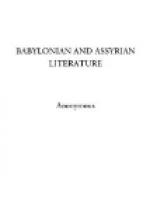The following psalm for remission of sins is remarkable alike for its deeply spiritual tone and for its antiquity. As it is written in Accadian, its composition must be referred to a date anterior to the seventeenth century B.C., when that language became extinct. An Assyrian interlinear translation is attached to most of the lines; some, however, are left untranslated. The tablet is unfortunately broken in the middle, causing a lacuna in the text. Similarities will be noticed between the language of the psalm and that of the Psalms of the Old Testament, and one passage reminds us strongly of the words of Christ in St. Matthew xviii. 22. Seven, it must be remembered, was a sacred number among the Accadians. Accadian poetry was characterized by a parallelism of ideas and clauses; and as this was imitated, both by the Assyrians and by the Jews, the striking resemblance between the form of Accadian and Hebrew poetry can be accounted for.
Some of the lines in the middle of the psalm have been previously translated by Mr. Fox Talbot, in the “Transactions of the Society of Biblical Archaeology,” Vol. II, p. 60, and Prof. Schrader in his “Hollenfahrt der Istar,” pp. 90-95.
A copy of the text is given in the fourth volume of the “Cuneiform Inscriptions of Western Asia,” plate 10.
AN ACCADIAN PENITENTIAL PSALM
OBVERSE OF TABLET
1 The heart of my Lord[1] was wroth: to his
place may he
return.
2 From the man that (sinned) unknowingly to his
place may
(my) god return.
3 From him that (sinned) unknowingly to her place
may
(the) goddess return.
4 May God who knoweth (that) he knew not to his
place
return.
5 May the goddess[2] who knoweth (that) he knew
not to
her place return.
6 May the heart of my god to his place return.
7 May the heart of my goddess to his place return.
8 May my god and my goddess (unto their place) return.
9 May god (unto his place) return.
10 May the goddess (unto her place return).
11 The transgression (that I committed my god) knew
it.
12 The transgression (that I committed my goddess
knew it).
13 The holy name (of my god I profaned?).
14 The holy name (of my goddess I profaned?).
(The next three lines are obliterated.)
18 The waters of the sea (the waters of my tears)
do I drink. 19 That which was forbidden by my god
with my mouth I ate. 20 That which was forbidden
by my goddess in my ignorance
I trampled upon.
21 O my Lord, my transgression (is) great, many (are)
my
sins.
22 O my god, my transgression (is) great, my sins
(are
many).
23 O my goddess, my transgression (is) great, my
sins (are
many).
24 O my god that knowest (that) I knew not, my transgression
(is) great, my sins (are many).
25 O my goddess, that knowest (that) I knew not,




